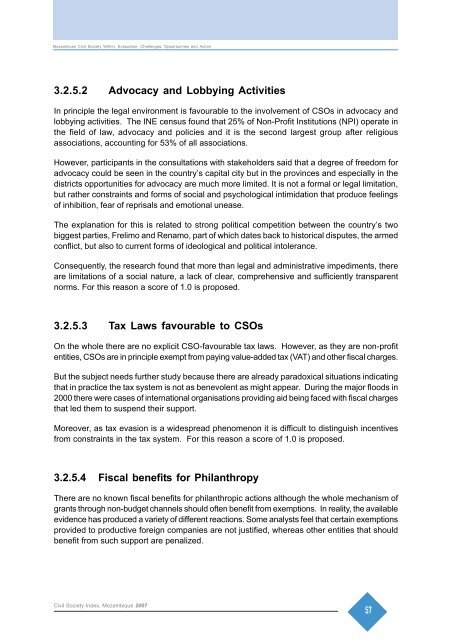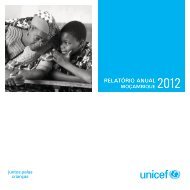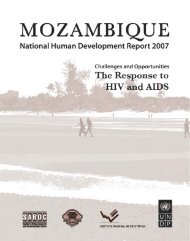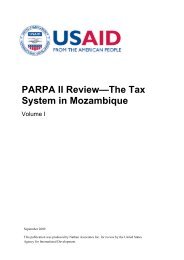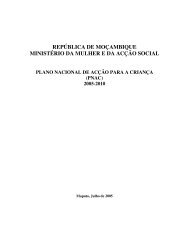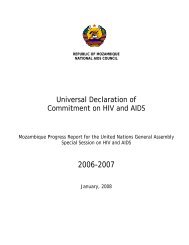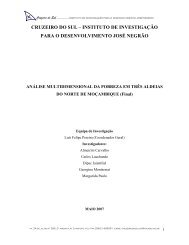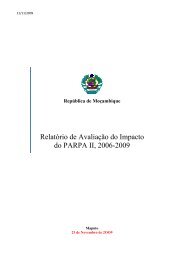Mozambican Civil Society Within: - UNICEF Mozambique - Home page
Mozambican Civil Society Within: - UNICEF Mozambique - Home page
Mozambican Civil Society Within: - UNICEF Mozambique - Home page
You also want an ePaper? Increase the reach of your titles
YUMPU automatically turns print PDFs into web optimized ePapers that Google loves.
<strong>Mozambican</strong> <strong>Civil</strong> <strong>Society</strong> <strong>Within</strong>: Evaluation, Challenges, Opportunities and Action<br />
3.2.5.2 Advocacy and Lobbying Activities<br />
In principle the legal environment is favourable to the involvement of CSOs in advocacy and<br />
lobbying activities. The INE census found that 25% of Non-Profit Institutions (NPI) operate in<br />
the field of law, advocacy and policies and it is the second largest group after religious<br />
associations, accounting for 53% of all associations.<br />
However, participants in the consultations with stakeholders said that a degree of freedom for<br />
advocacy could be seen in the country’s capital city but in the provinces and especially in the<br />
districts opportunities for advocacy are much more limited. It is not a formal or legal limitation,<br />
but rather constraints and forms of social and psychological intimidation that produce feelings<br />
of inhibition, fear of reprisals and emotional unease.<br />
The explanation for this is related to strong political competition between the country’s two<br />
biggest parties, Frelimo and Renamo, part of which dates back to historical disputes, the armed<br />
conflict, but also to current forms of ideological and political intolerance.<br />
Consequently, the research found that more than legal and administrative impediments, there<br />
are limitations of a social nature, a lack of clear, comprehensive and sufficiently transparent<br />
norms. For this reason a score of 1.0 is proposed.<br />
3.2.5.3 Tax Laws favourable to CSOs<br />
On the whole there are no explicit CSO-favourable tax laws. However, as they are non-profit<br />
entities, CSOs are in principle exempt from paying value-added tax (VAT) and other fiscal charges.<br />
But the subject needs further study because there are already paradoxical situations indicating<br />
that in practice the tax system is not as benevolent as might appear. During the major floods in<br />
2000 there were cases of international organisations providing aid being faced with fiscal charges<br />
that led them to suspend their support.<br />
Moreover, as tax evasion is a widespread phenomenon it is difficult to distinguish incentives<br />
from constraints in the tax system. For this reason a score of 1.0 is proposed.<br />
3.2.5.4 Fiscal benefits for Philanthropy<br />
There are no known fiscal benefits for philanthropic actions although the whole mechanism of<br />
grants through non-budget channels should often benefit from exemptions. In reality, the available<br />
evidence has produced a variety of different reactions. Some analysts feel that certain exemptions<br />
provided to productive foreign companies are not justified, whereas other entities that should<br />
benefit from such support are penalized.<br />
<strong>Civil</strong> <strong>Society</strong> Index, <strong>Mozambique</strong> 2007<br />
57


